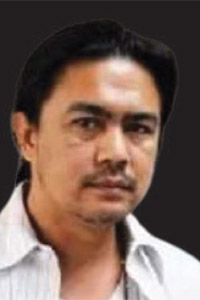
Becoming a commissioned officer in the Tatmadaw was a dream for many young men in Myanmar. Among them, was Captain Zero (real name withheld for safety reasons), an army officer who was once stationed in Magway, which lies northwest of Nay Pyi Taw.
But the coup staged by Senior General Min Aung Hlaing last year that triggered a torrent of resistance from pro-democracy citizens -- which have since faced a brutal crackdown -- has changed that perception.
The junta accused Aung San Suu Kyi's civilian administration of election fraud, following their landslide victory in the 2020 election. As the world watched in awe at what transpired, Ms Suu Kyi and her aides were jailed.
Many pro-democracy figures who challenged the junta were killed or arrested, and the conflict deepened with the escalation of fighting with minority groups.
Overnight, people's hatred of the junta boiled over.
At the start of the coup, Capt Zero said he didn't really know what was going on. But about three months after the putsch, after witnessing the Tatmadaw turn its weapons on unarmed citizens, he decided to flee the barracks and join the People's Defence Force, or the PDF.
Had there not been a coup, Capt Zero said he would have probably still been serving the Tatmadaw with pride.
He said most of the men in his unit were predominantly Burmese, which is also the case across the entire army. There was no place for ethnic minorities in the force, he said.
With the government using divide-and-conquer tactics to ensure Nay Pyi Taw maintained control, army officers were trained to regard ethnic groups as enemies.
Furthermore, they were indoctrinated with the idea that whoever threatens the army is the enemy.
When the NLD was in power, they attempted to weaken the army's influence, so army officers were told to be hostile to the NLD. By extension, people who side with the party, are now also seen as the enemy.
"Such a belief meant soldiers have no feelings when killing these people," he said.
Born in Yangon, Capt Zero joined the military as a cadet after finishing high school in 2009. He had wanted to become a soldier since he was young.
"Because in movies," he said, "army officers are portrayed as noble, protecting the country and its people."
There aren't many choices for Myanmar men when it comes to a career. Despite the low salaries, a job in the army means security and pride for the family. As an army captain, he was paid 300,000 kyat (about 6,000 baht) a month. Non-commissioned officers receive half that amount.
He was initially assigned to the army's ordnance disposal unit. Even though there was no chance of going to the frontlines, he liked the job and served the army with pride.
But the junta's onslaught on the people made him think again.
Capt Zero discussed deserting with his colleagues but no one agreed. They said their duty was to follow superiors' orders, so, in the end, he went alone.
He believes around 7,000 soldiers and police officers have deserted to join the people's side.
More may want to flee but dare not to, he said, adding most are worried about their families, while others have no idea where to go and what would happen if they left their barracks.
Although available figures say the Tatmadaw has about 400,000 soldiers, the biggest standing army in the world, Capt Zero said the number is much smaller. "The number of active troops is around 100,000. The rest hold administrative positions, or are conscripts with no combat experience," he said.
"More importantly, most of them have little morale because they know people despise them. People outnumber soldiers. If the fight continues, we will win."
He is full of confidence even though the ongoing fighting has caused massive losses on the PDF side, given better weapons on the part of the Tatmadaw.
Indeed, times have changed. Weapons alone can't ensure victory in this war between the old and young generations, and information technology will play an important role in uniting the people against the Tatmadaw.
Deep inside, the junta's leaders live in fear because they know the people hate them. Army officers dare not go back to their villages because they are afraid of the consequences. The Tatmadaw may seem to be advancing, but they are shrouded with fear. Besides, most officers are poor, only the junta's corrupt elite are rich.
They cited poll rigging by the Suu Kyi government as the reason for toppling her but the reality is that the army's leaders and their families committed graft, evaded tax and they feared being exposed. They had to take power.
"All the coup-makers in the world are the same. They always cite public interest but they just did it for themselves. Time will tell," he said.
"I am anti-dictatorship and will fight until we win. One day when power returns to the people, I will live an ordinary life."
Paskorn Jumlongrach is co-founder of transbordernew.in.th. This article is to mark the first anniversary of the coup d'etat in Myanmar.
